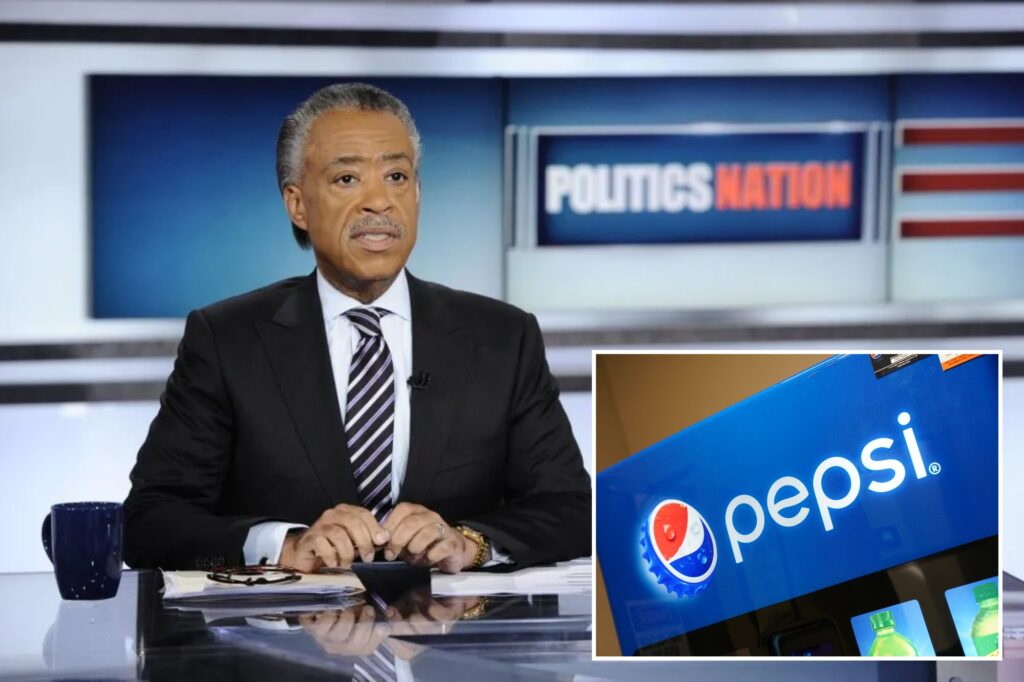🔴 Website 👉 https://u-s-news.com/
Telegram 👉 https://t.me/usnewscom_channel
Even the most ardent Al Sharpton watchers are likely to have groaned at the news that “the Rev.” has called for yet another boycott of companies that are scrapping their DEI initiatives.
This time, the target is Pepsi, which Sharpton “put on notice” last Saturday during his weekly MSNBC show.
Sharpton and his National Action Network nonprofit have apparently written to Pepsi to express their “profound disappointment” at the beverage giant’s February decision to eliminate its chief DEI officer position, along with its race-based hiring goals. Sharpton has given Pepsi three weeks to reverse these moves — or else face his organization’s wrath, along with that boycott.
According to recent polls by Reuters and The Economist, Americans are almost evenly divided over support for the types of DEI initiatives, which have been a target for President Trump since he returned to office.
There’s no guarantee a boycott will achieve anything more than furthering Sharpton’s bloated public profile.
But rather than merely scrap DEI outright — a position advocated by everyone from Bari Weiss to Bill Ackman and Chris Rufo — the unprecedented scrutiny now surrounding race-based preferences makes for an ideal (and long overdue) opportunity to question why they should exist in the first place.
And folks like Rev. Al — among the loudest voices demanding that DEI be maintained — should be tasked with providing the answers.
There is little doubt that America’s racial and economic divides have never been deeper. African Americans, for whom the benefits of DEI programs have always been most promised, now possess an average of just 15% of the family wealth of their white counterparts, according to a Brookings Institute report from last January.
This is a very real problem that deserves very real attention to devise very real solutions.
The real problem, however, is that so much of that attention has arrived in the form of DEI and other racialized entitlements, yet so little (if any) effort has been made to determine if these programs actually make a difference.
Indeed, with its outsized focus on equity — the equalizing of outcomes regardless of effort or merit — the only difference that truly matters for DEI strategists is no difference at all.
DEI is big business: a web of consultants, program officers, activists, and academics worth an estimated $11 billion last year. Placed in comparison, that’s the market capitalization of companies like GameStop or Hyatt Hotels — or the entire value of America’s organic farm sales.
Pixel-Shot – stock.adobe.com
But unlike hotel or tech firms, which must answer to shareholders, investors, and boards of directors, DEI-styled programming exists almost entirely without oversight or accountability.
This means that Rev. Al is demanding dispensations for an ideology with the power to determine careers and corporate policies — but with scant proven ROI (and I say this as someone who knows first-hand what it’s like to be a “#DEI hire”).
True, most companies or academic institutions release data around minority hiring or admissions. That can be informative. But what about their actual impact?
How many of those minority hires stick around long enough to rise to managerial or even C-level positions? How many of those matriculated students actually graduate? And how long does it take them — particularly compared to white students?
Precise answers and data around these questions are scarce, but according to a Harvard Business Review report, “most diversity programs aren’t increasing diversity.” In fact, the article continued, “the positive effects of diversity training rarely last beyond a day or two.”
As for higher education, the answers are equally discouraging. According to the National Center for Education Statistics, just 40% of black college students graduate within six years, compared to 64% for white students.
And these figures are declining despite the bloated bureaucracy that has developed around university DEI programming.
Meanwhile, how good is DEI for shareholders’ bottom line? Does it boost worker cohesion or even performance? According to James Fishback, founder of the new “anti-DEI” Azoria “meritocracy” investment fund, the answer is no.
“Over the past year, a portfolio of the three dozen S&P 500 companies with racial and gender hiring targets has returned just 12%, compared to the S&P 500’s 30%,” Fishback wrote in December. “Over two years, this portfolio has delivered 17%, compared to the S&P 500’s 60%.”
So why then should DEI continue — let alone be reinstated by companies like Pepsi? Particularly considering the dismal job DEI departments have done protecting Jewish students facing rising antisemitism on campuses nationwide?
These are the types of questions Sharpton should address — questions almost never asked of DEI stakeholders. DEI doesn’t strengthen companies or boost career growth, not even in the DEI industry itself, which saw a 33% nationwide attrition rate in late 2022. (Fun fact: Some 76% of remaining DEI officers are actually white, according to workplace consultancy Ravello Labs.)
America’s great DEI retrenchment has been as necessary as it has been controversial. Not because solutions to the nation’s vast economic and social inequality are not warranted but because DEI has not provided those solutions.
Instead, DEI has more often been a tool for manipulation and malfeasance, an easy “fix it” for white corporate guilt and the unregulated social justice groups that have profited from their billions in #BlackLivesMatter-era largesse.
Rev. Al is right to question whether the wholesale eradication of DEI is actually good for a nation that has never felt more separate and unequal.
However, metrics and data should be the focus of efforts to close the achievement gap, not boycott threats and other tools of coercion. And not from a man, like Sharpton, who’s taken over $1 million in bonuses alone from his own nonprofit.
